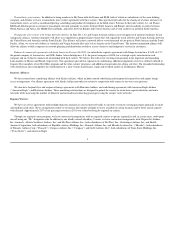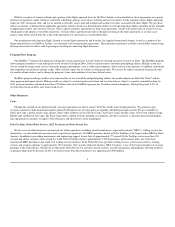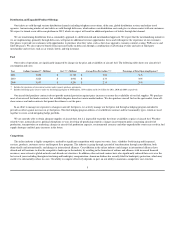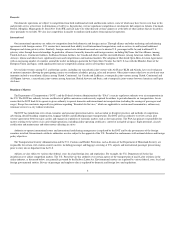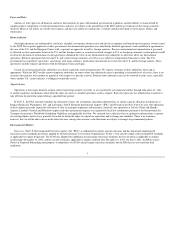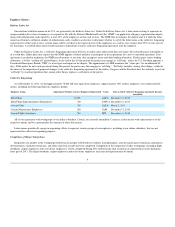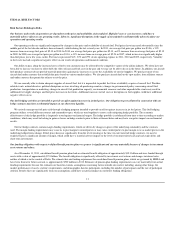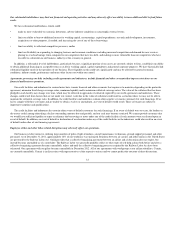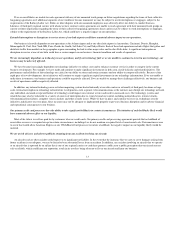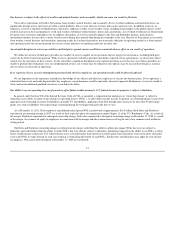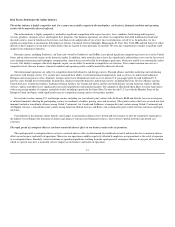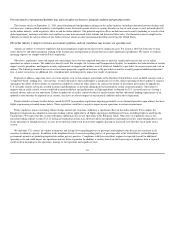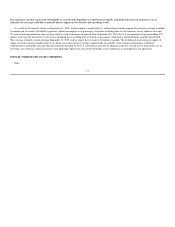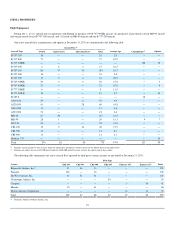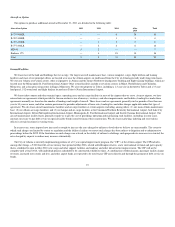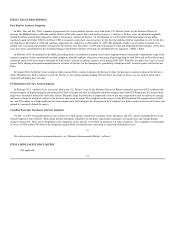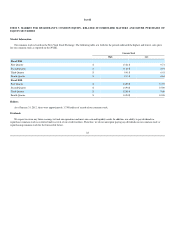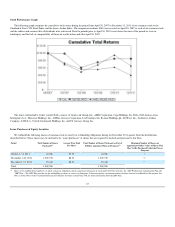Delta Airlines 2011 Annual Report Download - page 19
Download and view the complete annual report
Please find page 19 of the 2011 Delta Airlines annual report below. You can navigate through the pages in the report by either clicking on the pages listed below, or by using the keyword search tool below to find specific information within the annual report.
If we or our affiliates are unable to reach agreement with any of our unionized work groups on future negotiations regarding the terms of their collective
bargaining agreements or if additional segments of our workforce become unionized, we may be subject to work interruptions or stoppages, subject to the
requirements of the Railway Labor Act. Strikes or labor disputes with our unionized employees may adversely affect our ability to conduct business.
Likewise, if third party regional carriers with whom we have contract carrier agreements are unable to reach agreement with their unionized work groups on
current or future negotiations regarding the terms of their collective bargaining agreements, those carriers may be subject to work interruptions or stoppages,
subject to the requirements of the Railway Labor Act, which could have a negative impact on our operations.
Extended interruptions or disruptions in service at one of our hub airports could have a material adverse impact on our operations.
Our business is heavily dependent on our operations at the Atlanta airport and at our other hub airports in Amsterdam, Cincinnati, Detroit, Memphis,
Minneapolis-St. Paul, New York-JFK, Paris-Charles de Gaulle, Salt Lake City and Tokyo-Narita. Each of these hub operations includes flights that gather and
distribute traffic from markets in the geographic region surrounding the hub to other major cities and to other Delta hubs. A significant interruption or
disruption in service at one of our hubs could have a serious impact on our business, financial condition and results of operations.
We are increasingly dependent on technology in our operations, and if our technology fails or we are unable to continue to invest in new technology, our
business may be adversely affected.
We have become increasingly dependent on technology initiatives to reduce costs and to enhance customer service in order to compete in the current
business environment. For example, we have made and continue to make significant investments in delta.com, check-in kiosks and related initiatives. The
performance and reliability of the technology are critical to our ability to attract and retain customers and our ability to compete effectively. Because of the
rapid pace of new developments, these initiatives will continue to require significant capital investments in our technology infrastructure. If we are unable to
make these investments, our business and operations could be negatively affected. If we are unable to manage these challenges effectively, our business and
results of operations could be negatively affected.
In addition, any internal technology error or failure impacting systems hosted internally at our data centers or externally at third party locations or large
scale external interruption in technology infrastructure we depend on, such as power, telecommunications or the internet, may disrupt our technology network.
Any individual, sustained or repeated failure of technology could impact our customer service and result in increased costs. Our technology systems and
related data may also be vulnerable to a variety of sources of interruption due to events beyond our control, including natural disasters, terrorist attacks,
telecommunications failures, computer viruses, hackers and other security issues. While we have in place, and continue to invest in, technology security
initiatives and disaster recovery plans, these measures may not be adequate or implemented properly to prevent a business disruption and its adverse financial
and reputational consequences to our business.
Our primary credit card processors have the ability to take significant holdbacks in certain circumstances. The initiation of such holdbacks likely would
have a material adverse effect on our liquidity.
Most of the tickets we sell are paid for by customers who use credit cards. Our primary credit card processing agreements provide that no holdback of
receivables or reserve is required except in certain circumstances, including if we do not maintain a required level of unrestricted cash. If circumstances were
to occur that would allow American Express or our VISA/MasterCard processor to initiate a holdback, the negative impact on our liquidity likely would be
material.
We are at risk of losses and adverse publicity stemming from any accident involving our aircraft.
An aircraft crash or other accident could expose us to significant tort liability. In the event that the insurance that we carry to cover damages arising from
future accidents is not adequate, we may be forced to bear substantial losses from an accident. In addition, any accident involving an aircraft that we operate
or an aircraft that is operated by an airline that is one of our regional carriers or codeshare partners could create a public perception that our aircraft are not
safe or reliable, which could harm our reputation, result in air travelers being reluctant to fly on our aircraft and harm our business.
13


